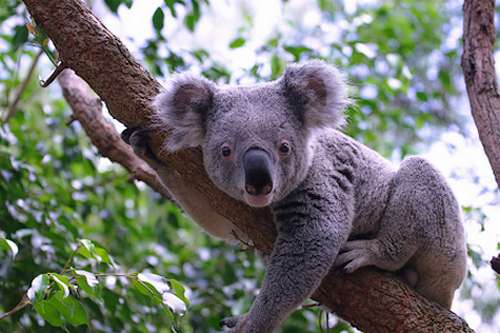 Animals are multicellular, eukaryotic organisms of the kingdom animalia (also called Metazoa). All animals are motile, meaning they can move spontaneously and independently at some point in their lives. Their body plan eventually becomes fixed as they develop, although some undergo a process of metamorphosis later on in their lives. All animals are heterotrophs: they must ingest other organisms or their products for sustenance.
Animals are multicellular, eukaryotic organisms of the kingdom animalia (also called Metazoa). All animals are motile, meaning they can move spontaneously and independently at some point in their lives. Their body plan eventually becomes fixed as they develop, although some undergo a process of metamorphosis later on in their lives. All animals are heterotrophs: they must ingest other organisms or their products for sustenance.
Most known animal phyla appeared in the fossil record as marine species during the Cambrian explosion, about 542 million years ago. Animals can be divided broadly into vertebrates and invertebrates. Vertebrates have a backbone or spine (vertebral column), and amount to less than five percent of all described animal species. They include fish, amphibians, reptiles, birds and mammals. The remaining animals are the invertebrates, which lack a backbone. These include molluscs (clams, oysters, octopuses, squid, snails); arthropods (millipedes, centipedes, insects, spiders, scorpions, crabs, lobsters, shrimp); annelids (earthworms, leeches), cnidarians (jellyfish, sea anemones, corals), and sponges. The study of animals is called zoology.
 The word "animal" comes from the Latin animalis, meaning having breath, having soul or living being. In everyday non-scientific usage the word excludes humans – that is, "animal" is often used to refer only to non-human members of the kingdom Animalia; often, only closer relatives of humans such as mammals and other vertebrates, are meant. The biological definition of the word refers to all members of the kingdom animalia, encompassing creatures as diverse as sponges, jellyfish, insects, and humans.
The word "animal" comes from the Latin animalis, meaning having breath, having soul or living being. In everyday non-scientific usage the word excludes humans – that is, "animal" is often used to refer only to non-human members of the kingdom Animalia; often, only closer relatives of humans such as mammals and other vertebrates, are meant. The biological definition of the word refers to all members of the kingdom animalia, encompassing creatures as diverse as sponges, jellyfish, insects, and humans.Photo: African wild dog pups

Well, the koala is not an Australian Outback animal, but it39;s so

worker from the Belarusian radiation ecology reserve measures the

Blue Wild Angel: Jimi Hendrix Live At The Isle Of Wight DVD Cover, DVD
 Thank You for Visiting this Page
Thank You for Visiting this Page
 Most known animal phyla appeared in the fossil record as marine species during the Cambrian explosion, about 542 million years ago. Animals can be divided broadly into vertebrates and invertebrates. Vertebrates have a backbone or spine (vertebral column), and amount to less than five percent of all described animal species. They include fish, amphibians, reptiles, birds and mammals. The remaining animals are the invertebrates, which lack a backbone. These include molluscs (clams, oysters, octopuses, squid, snails); arthropods (millipedes, centipedes, insects, spiders, scorpions, crabs, lobsters, shrimp); annelids (earthworms, leeches), cnidarians (jellyfish, sea anemones, corals), and sponges. The study of animals is called zoology.
Most known animal phyla appeared in the fossil record as marine species during the Cambrian explosion, about 542 million years ago. Animals can be divided broadly into vertebrates and invertebrates. Vertebrates have a backbone or spine (vertebral column), and amount to less than five percent of all described animal species. They include fish, amphibians, reptiles, birds and mammals. The remaining animals are the invertebrates, which lack a backbone. These include molluscs (clams, oysters, octopuses, squid, snails); arthropods (millipedes, centipedes, insects, spiders, scorpions, crabs, lobsters, shrimp); annelids (earthworms, leeches), cnidarians (jellyfish, sea anemones, corals), and sponges. The study of animals is called zoology. Most known animal phyla appeared in the fossil record as marine species during the Cambrian explosion, about 542 million years ago. Animals can be divided broadly into vertebrates and invertebrates. Vertebrates have a backbone or spine (vertebral column), and amount to less than five percent of all described animal species. They include fish, amphibians, reptiles, birds and mammals. The remaining animals are the invertebrates, which lack a backbone. These include molluscs (clams, oysters, octopuses, squid, snails); arthropods (millipedes, centipedes, insects, spiders, scorpions, crabs, lobsters, shrimp); annelids (earthworms, leeches), cnidarians (jellyfish, sea anemones, corals), and sponges. The study of animals is called zoology.
Most known animal phyla appeared in the fossil record as marine species during the Cambrian explosion, about 542 million years ago. Animals can be divided broadly into vertebrates and invertebrates. Vertebrates have a backbone or spine (vertebral column), and amount to less than five percent of all described animal species. They include fish, amphibians, reptiles, birds and mammals. The remaining animals are the invertebrates, which lack a backbone. These include molluscs (clams, oysters, octopuses, squid, snails); arthropods (millipedes, centipedes, insects, spiders, scorpions, crabs, lobsters, shrimp); annelids (earthworms, leeches), cnidarians (jellyfish, sea anemones, corals), and sponges. The study of animals is called zoology. Thank You for Visiting this Blog
Thank You for Visiting this Blog
 Animals are multicellular, eukaryotic organisms of the kingdom animalia (also called Metazoa). All animals are motile, meaning they can move spontaneously and independently at some point in their lives. Their body plan eventually becomes fixed as they develop, although some undergo a process of metamorphosis later on in their lives. All animals are heterotrophs: they must ingest other organisms or their products for sustenance.
Animals are multicellular, eukaryotic organisms of the kingdom animalia (also called Metazoa). All animals are motile, meaning they can move spontaneously and independently at some point in their lives. Their body plan eventually becomes fixed as they develop, although some undergo a process of metamorphosis later on in their lives. All animals are heterotrophs: they must ingest other organisms or their products for sustenance. Thanks for Reading this Website
Thanks for Reading this Website